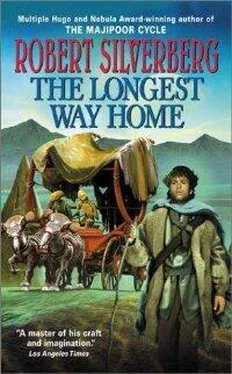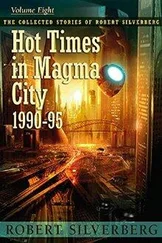“What is your father’s name?”
“Martin Master Keilloran.”
“And his father?”
“Eirik Master Keilloran.”
“Your mother’s name?”
“Wireille. She is dead.”
The scar-faced officer looked toward the other two. Something passed between them, some sign, some wordless signal, that Joseph was unable to interpret. The officer who had twice interrogated him gave a single forceful nod. Then the second man, the oldest of the three, turned to Joseph and said, “The free people of Manza have no quarrel with the Masters of Helikis, and they are not interested in starting one now. As soon as it is practical you will be taken to the border, Joseph Master Keilloran, and turned over to your own kind.”
Joseph stared. And blurted: “Do you seriously mean that?”
At once he saw the flash of anger in the scar-faced officer’s eyes. The ugly scar stood out in a blaze of red. “We of the Liberation have no time for jokes.” The words were spoken, this time, in Folkish.
“I ask you to forgive me, then,” Joseph said, in Folkish also. “I’ve been through a great deal this past year, very little of it good. And I was expecting you to say that you were sentencing me to death.”
“Perhaps that is what we should do,” the scar-faced man said. “But it is not what we will do. As I said: you will be taken to the border.”
Joseph still had difficulty in believing that. It was all some elaborate ruse, he thought, a ploy intended to soften him up so that they could come at him in some unexpected way and extract the truth from him about his espionage activities. But if that was so, they were going about it in a very strange way. He was transferred from the prisoners’ compound to a barracks at the other side of the camp, where, although he was still under guard, he had a small room to himself. His pack and everything that had been in it were restored to him. Instead of the abysmal prisoner food he was given meals that, although hardly lavish, were at least nourishing and sound. It was the quality of the food that led Joseph at last to see that what was going on was something other than a trick. They did not want to send him back to Helikis as a creature of skin and bone. They would fatten him up a little, first, to indicate to the Masters of Helikis that the free people of Manza were humane and considerate persons. Perhaps they would even send the camp barber in to cut his hair and trim his beard, too, and outfit him with a suit of clothes of the sort a young Master would want to wear, too. Joseph was almost tempted to suggest that, not in any serious way, to one of his jailers, a young, easy-going Folker who appeared to have taken a liking to him. But it was not a good idea, he knew, to get too cocky with his captors. None of these people had any love for him. None would be amused by that sort of presumptuousness.
The fact that they were calling their uprising the Liberation told Joseph what their real attitude toward him was. They hated Masters; they looked upon the whole race of them as their enemies. They were not so much offering him assistance in getting back to his home as they were merely spitting him out. He was no concern of theirs, this strayed Master out of the wrong continent, and very likely if all this had been happening six or eight months before they would simply have executed him the moment they had realized what he was. It was only by grace of whatever political situation currently existed between the liberated Folk of Manza and the Masters who must still be in power in Helikis that he had been allowed to live. And even now Joseph was still not fully convinced of the sincerity of the scar-faced man’s words. He did not plan to test them by trying to enter into any sort of easy intimacy with those who guarded him.
Four days went by this way. He saw no one but his jailers in all this time.
Then on the fifth morning he was told to make himself ready for departure, and half an hour later two soldiers, uncongenial and brusque, came for him and escorted him to a waiting car, where a third man in Liberation uniform was at the controls. His two guards got in beside him. He was not riding in any clumsy jolting wagon this time, no open wooden cart, no farm truck. The vehicle was a smooth, sleek car of the sort that a Master might use, and probably once had.
The road went due westward, and then a little to the north. Joseph was in the habit by this time of determining his course by the position of the sun. Neither of his guards said a word, to each other or to him. After several hours they stopped for lunch at an ordinary public roadhouse: he was leaving the wilderness world behind, reentering the one he had once known, prosperous-looking farms on all sides, fields awaiting harvest, farm vehicles moving up and down the roads, everything seeming quite as it should but obviously under Folk control, no sign of a Master presence anywhere. The guards, silent as ever, watched him closely while they ate; when he asked to go to the restroom, one of them went with him. Joseph clearly saw that they had been ordered to prevent him from escaping, if that was what he had in mind, and probably they would shoot him if they thought that that was what he was trying to do. So, just as he still did not completely believe that he was being released, they did not completely believe that he was not a spy.
An hour more of driving, after lunch, brought them to an airfield, a smallish one that nevertheless must have been a reasonably important commercial field before the Liberation but now looked somewhat run down. A solitary plane, with dull-toned Liberation emblems painted over whatever insignia it had borne before, was waiting on the runway. The sight of it was another powerful reminder for Joseph of the modern civilized world that was somewhere out there, that he once had lived in and would be returning to now. He wondered how easy it was going to be to fit himself back in. His guards led him aboard, taking him to a seat in the front of the cabin, where he could not see any of his fellow passengers.
Joseph wondered if this was actually a flight to Helikis. Could that be possible? Had everyone on Homeworld already settled into such a complacent acceptance of the new order of things in liberated Manza that normal air traffic between the continents had resumed?
He had his answer soon enough. The plane took off, soared quickly to its cruising altitude, moved off on a southerly course. Joseph, sitting in the middle of a group of three seats, leaned forward across the guard at his right to stare out the window, looking hopefully for the narrowing of the land below that would tell him that they were nearing the sea and approaching the Isthmus, the little bridge of land that separated the two continents. But he saw no coastline down there, only an immense expanse of terrain, most of it divided into cultivated patches, reaching to each horizon. They were still in Manza. And now the plane was starting to descend. The flight had lasted perhaps two and a half hours, three at most. They had gone only a relatively short distance, at least as aerial journeys went, though Joseph knew now that it would have taken him several lifetimes to cover that relatively short distance on foot, as he had with so much bravado intended to do. And he was still a long way from home.
“Where are we landing?” Joseph asked one of his guards.
“Eivoya,” the guard said. The name meant nothing to Joseph. “It is where the border is.”
It hardly seemed worthwhile to seek a more detailed explanation. The plane touched down nicely. Another car was waiting for Joseph at the edge of the runway. Once again the two guards took seats on either side of him. This time they drove about an hour more: it was getting to be late in the day, and Joseph was growing very tired, tired of this long day’s traveling, tired of sitting between these two uncommunicative men, tired of having things happen to him. He realized that he was probably as close to home as he had been in over a year, and that this day he had covered a greater distance toward that goal than he had managed to cross by his own efforts in all the time since the burning of Getfen House. Yet he felt no sense of mounting jubilation. He still did not know what further obstacles lay between him and Keilloran. He might not even get there at all. And he was weary to the bone. This is what it feels like to be old, he thought. To cease to care, even about things that you have sought to achieve. I have aged seventy years in just these few months.
Читать дальше












